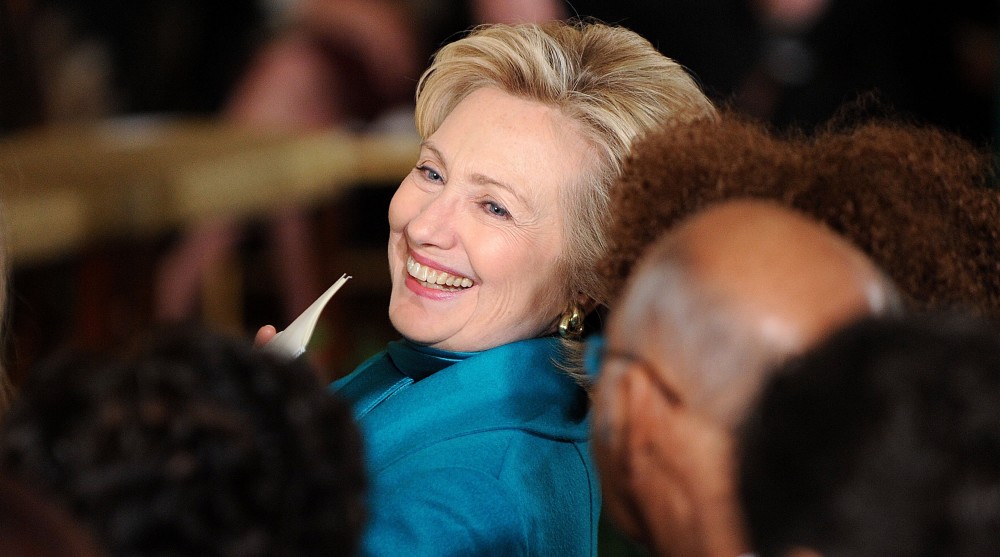By Maeve Reston
Los Angeles Times.
WASHINGTON
With Hillary Clinton’s 2016 presidential run looking like a foregone conclusion, the question now is whether she has a message.
Fresh off a visit to Iowa and two events last week in Washington where she sought to reconnect with female voters, Clinton has sounded increasingly like a candidate. She hints at her presidential ambitions with wink-and-a-nod asides like the one in Iowa: “It is true, I’m thinking about it.”
Yet in framing what she described Friday as her “long career of fighting for women, and children, and fairness, and equality, and justice,” Clinton has nearly mastered the art of avoiding controversy, offering dry speeches and a pitch that seems intended to be inoffensive.
Rather than staking out attention-grabbing positions or wading into policy debates, Clinton seems focused on humanizing an image that has suffered in the past from accusations of brittleness. She rarely misses an opportunity to suggest that her soon-to-arrive grandchild is inspiring her to take another look at politics.
“I’ve been thinking a lot about family, because, you know, I’m on grandbaby watch,” she wryly told a mostly female audience at a Democratic conference Friday.
“We will certainly do everything possible to prepare this child, protect this child. But I want that for everybody’s child, and everybody’s grandchild.”
Pivoting into what began to sound like a campaign speech, she added: “I want every one of our children to feel that they are inheriting the best of America…. That this country is on your side; that this country will give you the fighting chance, the fair shot you deserve.”
Those sorts of gauzy statements have become Clinton’s hallmark this year.
The former secretary of state has said little, for example, about the president’s controversial strategy for defeating Islamic State militants in Iraq and Syria, or where she might draw the line on the mission of U.S. troops, a fraught issue after her Senate vote authorizing the use of force in Iraq in October 2002 complicated her last presidential campaign.
Her recent speech on energy policy avoided hot-button topics like the Keystone pipeline and was largely devoid of any new policy prescriptions: “Good ideas are everywhere you look,” she said in one typical line, “Imagine what we can do as a country if we all roll up our sleeves and get to work.”
When confronted by an activist on the rope line in Iowa about whether she agreed with President Barack Obama’s decision to delay until after the election his promised executive action on immigration, she deliberately sidestepped the issue before moving on: “I think we need to elect more Democrats,” she crisply told the young woman, who identified herself to Clinton as “a DREAMer,” brought to the U.S. illegally as a child.
So far, Clinton’s lack of specificity has made it difficult to discern what distinct argument she would make for her candidacy.
A potential rival from the left, Massachusetts Sen. Elizabeth Warren, who recently published her book “A Fighting Chance,” cuts a sharp contrast to Clinton in that sense, she is succinct as she rails against banks and Wall Street for “cheating families.”
Warren, who so far has insisted she will not run for president, brought cheering activists to their feet in Detroit this summer with a feisty, populist speech declaring that “the game is rigged” against working Americans: “If we push back against the biggest, strongest, most ruthless lobbying effort in the country,” Warren said of big banks, “if we push back hard, we can win.”
Clinton drew a more muted response with her somewhat meandering speech at Iowa Sen. Tom Harkin’s annual steak fry last weekend, which seemed to pull threads from her husband’s presidential campaigns in 1992 and 1996, dusting off his signature line about championing Americans who “work hard and play by the rules,” and worry that their children will be worse off than they were.
The one area where Clinton has been most visibly passionate, throughout her career and now as she ponders another bid to be the first woman president, has been her advocacy for the rights of women and girls around the world.
That subject will be showcased at the Clinton Global Initiative gathering, which begins Sunday night in New York.
When she was introduced this week by Harkin and Democratic National Committee Chairwoman Debbie Wassermann Schultz, both recalled Clinton’s groundbreaking 1995 speech at a women’s conference in Beijing where she declared, “Let it be that human rights are women’s rights, and women’s rights are human rights, once and for all.”
Clinton closed her 2008 presidential candidacy with a concession speech that played on her historic effort, saying that although she and her team “weren’t able to shatter that highest, hardest glass ceiling this time… it’s got about 18 million cracks in it.”
As a potential reprise nears, Clinton seems to be attempting to expand that mantra from breaking barriers herself to her desire to create greater security for the middle class through initiatives like raising the minimum wage, expanding access to childcare and ensuring that women and men are paid equally.
“We talk about a glass ceiling,” she said during a panel Thursday at the Center for American Progress, “these women don’t even have a secure floor under them.”
By the next day, at the Democratic gathering in Washington, she had sharpened the line: “No wonder so many families are hurting today. For too many women, for too many families, they don’t just face ceilings on their dreams, it feels to them as though the floor has collapsed beneath their feet.”
“These aren’t just women’s issues, they are family issues,” she added, “they are American issues and they hold back our entire economy.”
It seemed to be the seed of a 2016 message.














































































































































































































































































































































































